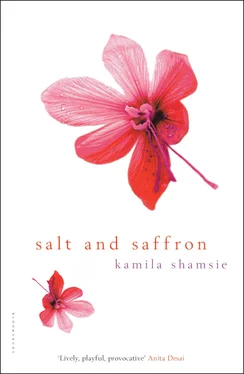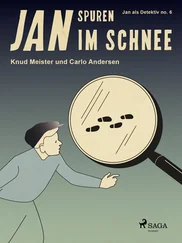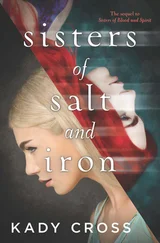I held the sauce boat up to my nose again. Tamarind. It was only at college, when the racks of spices and international foods at Stop ‘n’ Shop forced me to confront the inadequacy of my culinary English, that I ran for my Urdu-English dictionary and discovered that imli was tamarind. It was several days later that I thought, Sounds a little like Taimur Hind.
Taimur Hind. To explain what that name means to me I must return to the triplets, those not-quite-twins. Their father, my great-grandfather, was so terrified to hear the circumstances of their births that he put yaks and their milk out of his mind and concentrated on averting disaster. He was well intentioned, of course, but in my family that’s just a euphemism for stupid. He said, ‘We’ll call them Sulaiman, Taimur and Akbar.’ He thought bearing the names of great kings would enable his sons to face up to any crisis, but he never paused to think what would have happened if their namesakes — Sulaiman the Magnificent, Akbar the Great, and Taimur, sometimes called Taimur Lang or Tamburlaine, but so unimpeded by his lameness that no one ever pictures him crippled — had been born brothers. Romulus and Remus, Aurangzeb and Dara Shikoh, Richard the Lionheart and King John would seem, by comparison, merely to bicker affectionately. (Though in the case of John and Richard it seems that their legendary disharmony may have been exaggerated by the Robin Hood tales, and incidentally I’ve never had much sympathy for the Crusaders.)
Of the triplets, Taimur was the one born on the cusp. His brothers adored him and were always arguing over which one of them shared the same birthday as Taimur. Are you born at the moment your head emerges into the light, as my grandfather, Akbar, claimed, or at the moment when every last inch of you is caressed by air, as Sulaiman insisted.
Taimur, when asked his date of birth, said, ‘I was born between my brothers.’ And when he grew older he added, ‘There is nothing more arbitrary than the chime separating one day from the next.’
Things I know about Taimur: he was the most beautiful of the brothers, while Akbar was the most dashing and Sulaiman the most charming; when he was four he bit the nose off Dadi’s stuffed reindeer and Dadi, in retaliation, bit his index finger; he was the sweetest timer of the cricket ball that you could hope to see, but at boarding school in England his run average remained lower than Akbar’s because he so often forgot to ground his bat after completing a run; he loved the poems of Emily Dickinson; before he left for boarding school he had an English governess who called him Percy (Sulaiman was Alfred and Akbar was Gordie); he played the sitar; also, the harpsichord; it was he who persuaded his brothers to join him in leaping off a second-floor balcony in the Dard-e-Dil palace when home for the holidays at the age of sixteen, their broken legs and the intercession of the Nawab on their behalf finally convincing their father to allow them to finish their secondary education in Dard-e-Dil with their cousins, under the guidance of the private tutors at the palace; he despised politicians before it was fashionable to do so, but his most prized possession was a cane belonging to Liaquat, which he either stole or received as a gift from Liaquat after mockpretending to steal it (the stories here vary, but I prefer the latter version); he could devour pounds of fried okra at a single sitting, though his appetite was otherwise unremarkable; in 1938, shortly before the brothers were due to leave for Oxford, he disappeared.
He disappeared and remained that way. For two weeks his family was made efficient by terror, until the arrival of an envelope with an indistinct postal stamp and Taimur’s looping Ds made the postmaster spill his morning cup of tea and sent him pedalling frantically to my family’s home.
Dadi was with her cousins, Akbar and Sulaiman, when the letter arrived and, though she swears she read it only once, she can still recite the letter from memory, her fingers tracing Ds in the air as she speaks:
My brothers, we were born the year after the Jalianwalla massacre. Think of this when you are strolling down paths in Oxford, studying how to be Englishmen and do well in the world. I lack your gift for erasing, nay! evading history. The writing of this letter is the last thing I do before entering into the employ of an English army officer, as a valet. I have accepted my historical role, and when you return from Oxford and take your positions in the ICS or in English-run companies the only real difference between us will be that I am required to wear a grander uniform. You will not hear from me again for I am repudiating English and, alas! those years of English schooling have robbed me of the ability to write Urdu. From the time of our births we have been curses waiting to happen, but now the suspense is over. This is our curse: Akbar, Sulaiman, we are kites that have had their strings snipped. We went to school in a place without sun, and believed this meant we had no need of our shadows. I am not an Englishman, nor are you. Nor can we ever be, regardless of our foxtrots, our straight bats, our Jolly Goods and I Says.
No more the Anglicized Percy, I.
I am now Taimur Hind.
Dadi always ends her recitations with a final flourish of D. And always, always she says, ‘We thought it was a joke. How could it not be a joke? He wrote, Nay! He never said, Nay! except when he was mimicking our uncle, Ashraf.’
‘What would you have done,’ I once had the courage to ask Dadi, ‘if you had been at an Englishman’s house and saw a valet with your tooth mark on his index finger?’
If she had cried then, as I thought she was going to, our relationship might have survived what was yet to come. But, instead, she threw back her head and said, ‘Family retainers were one thing, but what reason had I to look at other people’s servants?’
Unconsciously I had dipped my fingers in the tamarind. ‘You know the real reason they thought Taimur’s letter was a joke?’ I said to Samia, putting the sauce boat down. ‘They couldn’t believe that a Dard-e-Dil could possibly become a servant.’
Samia shook her head at me. ‘Who says your version of events is less clouded than anyone else’s? When I’m reading old historical accounts I like to find out as much as I can about each contributor.’
‘Oh, no. You’ve become one of those deadly types like Sara Smith in my Intro Shakespeare class, who said it would be like, really, like, helpful, if we knew more about Shakespeare’s relationship with his daughters, because then we’d, like, understand King Lear, like, better.’
‘Shut up, shorty.’
‘Take off those block-heels and try saying that.’
That kept her quiet for a few seconds. Then she said, ‘They’re here.’
‘You do enigma so well.’
‘Our Indian relatives. Some of them are here. I’ve accepted an invitation to their place for elevenses today. What do you say? Will you come?’
I had met one of the Indian relatives, years before, in Karachi. On that day, I remember, I was wearing the T-shirt with a bullet hole in it. As far as I was concerned, the fact that I wasn’t actually wearing the shirt at the time the bullet hole made its appearance had done nothing to detract from the glamour of the ravaged cloth. Our dhobi had been carting my family’s freshly laundered clothes towards our house when someone shot at his donkey-cart. No one was ever able to determine whether the motives were sectarian (our dhobi was a Shi’a) or more literally asinine (the donkey was a champion racer whose three successive victories had reputedly angered a Mr Billo, who was missing a finger and was, therefore, dangerous). The donkey lost the tip of an ear, my shirt lost the embossed letter B and henceforth warned DON’T UG ME! but the donkey only became more aerodynamic and I briefly acquired the nickname Ug, which I secretly loved.
Читать дальше












